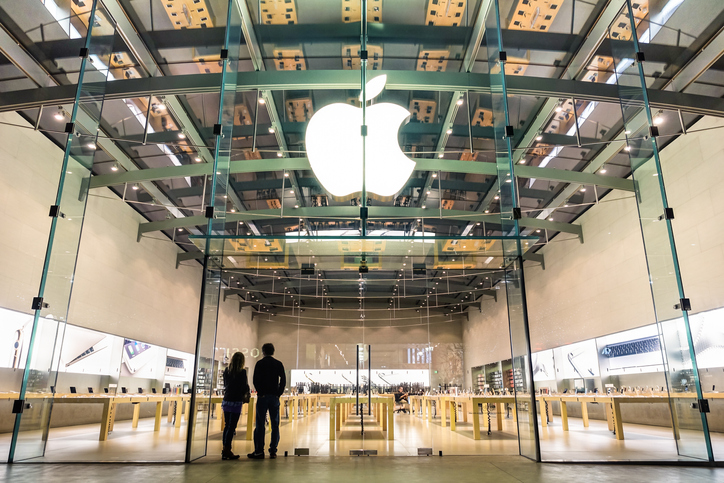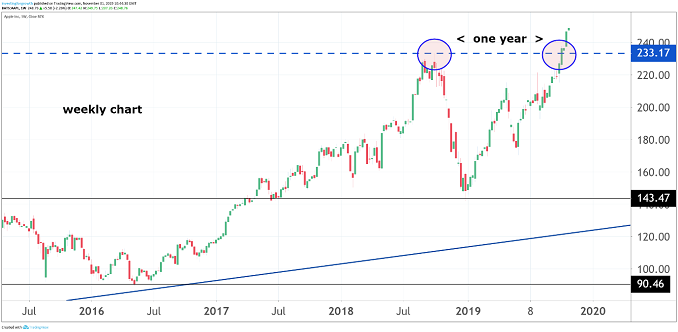Stockwatch: The investment case for Apple
It's had a stunning 2019, but should you buy now, or is it time to sell Apple shares?
1st November 2019 10:52
by Edmond Jackson from interactive investor
It's had a stunning 2019, but should you buy now, or is it time to sell Apple shares?

Firm results for its fourth quarter to 28 September have provided fresh zest for the world's biggest listed stock listed on Nasdaq.
Apple (NASDAQ:AAPL)'s share price has edged up 3% or so to an all-time high near $249 despite being at the epicentre of US/China trade frictions after the US made spying allegations over tech-giant Huawei and China hit back at Apple for fomenting unrest in Hong Kong. This is significant not just for investor confidence in Apple but more widely – suggesting it is more a stock-picker's market than 'Avoid', especially with the Federal Reserve providing stimulus.
Medium-term prospects for the US market still hinge on a reasonably satisfactory compromise in the trade war, where signals have lately differed, but the reasoning is President Trump will move to ensure progress given a presidential election in a year's time. Sounding tough is one thing but "America First" can't involve harming the economy (voters will reckon).
Macro aside, Apple's chart is impressive: soaring from around $2 in early 2004, and with three key drops in 2012, 2015 and 2018, demonstrating it is not immune to a market reversal as was the case at the end of last year.
The stock has been notably resilient despite holiday-time jitters this year. I was bullish initially as a contrarian play back in August 2013, when (adjusted for stock splits) the price of $71 represented 12.5x historic earnings versus 29x today. But the rationale remains similar, of how a major refreshment of products is transforming the group away from reliance on iPhones.

Source: TradingView Past performance is not a guide to future performance
"Getting there" to re-affirm a growth profile
The stock price high tallies with record results, although group revenue edged up barely 2% to $64 billion (£49.5 billion) and diluted earnings per share (EPS) by 4% to $3.03, yet the financials beat expectations and its composition affirmed progress in the new products/services coming through.
The table below shows a 9% year-on-year decline in iPhone revenues, although Apple has this year introduced lower-price models besides top-range, versus Chinese rivals especially. Services are growing nicely at 18% representing nearly 20% of group total; wearables and home products are up 54% to 10% of total; and, while the iPad is in fifth place, it is up 17%.
Meanwhile, the cash machine continues to roar: operating profit has reached $19.9 billion and $48.8 billion cash reserves - up a remarkable 89% on a year before – which underwrote $18 billion share buybacks and $3.5 billion dividends.
It is significant to the investment case, supporting investment in new areas such as TV (taking on Netflix) and bolstering EPS through buybacks until group revenue growth is hopefully sexier. Shareholders might ask why not pay out a greater element given the prospective yield is barely 1.3%, but if their constituency broadly seeks EPS growth, then perhaps it is best to prioritise investment and buybacks.
| Apple Inc - category & geographic sales | ||||
|---|---|---|---|---|
| $ millions | ||||
| Three months ended | Twelve months ended | |||
| 28-Sep-19 | 29-Sep-18 | 28-Sep-19 | 29-Sep-18 | |
| By category: | ||||
| iPhone | 33,362 | 36,755 | 142,381 | 164,888 |
| Mac | 6,991 | 7,340 | 25,740 | 25,198 |
| iPad | 4,656 | 3,983 | 21,280 | 18,380 |
| Wearables, home etc | 6,520 | 4,223 | 24,482 | 17,381 |
| Services | 12,511 | 10,599 | 46,291 | 39,748 |
| Total net sales: | 64,040 | 62,900 | 260,174 | 265,595 |
| By area: | ||||
| Americas | 29,322 | 27,517 | 116,914 | 112,093 |
| Europe | 14,946 | 15,382 | 60,288 | 62,420 |
| Greater China | 11,134 | 11,411 | 43,678 | 51,942 |
| Japan | 4,982 | 5,161 | 21,506 | 21,733 |
| Rest of Asia Pacific | 3,656 | 3,429 | 17,788 | 17,407 |
| Total net sales: | 64,040 | 62,900 | 260,174 | 265,595 |
Source: Company REFS
Latest smartphone industry data is positive
Coincidental with these results is news that the global smartphone market grew 2% (annualised) in 2019's third quarter, marking a first period of growth after a two-year slump that raised fears about saturation.
Samsung (LSE:SMSN) leads the market with an impressive 8% like-for-like rise in shipments to 78.2 million phones, helped by new products targeting every possible market and price niche. A doubt being expressed is that this 2% market rise reflects Huawei doing very well in its domestic market (nationalistic Chinese buying during the trade war?) to achieve a 29% growth rate.
- Is this tech giant a Brexit hedge?
- ii view: Apple reports record revenue
- US earnings preview: some red flags, but no white ones – yet
Apple sits in third place with a 12% market share, ahead of newer Chinese rivals with around 9% each but well behind Huawei with 19% share and Samsung with 22%. With iPhones still representing over half of Apple revenues, consumer reaction to each new generation remains important.
It's hard to guess the overall upshot however, when you are also judging "Apple versus Android" and whether phone buyers want to be part of the wider Apple ecosystem. But at least the industry narrative has changed from declining global smartphone sales.
Apple offers freebies
Scope to leverage group sales is shown by Apple's marketing pitch launched today, hitting Netflix directly: any purchase of an iPhone, iPod Touch, Mac or Apple TV will get a year's free subscription worth £59.88. This applies to devices bought since 10 September; also students signed up to Apple Music can get the streaming TV service for free, i.e. £4.99 month.
It's an aggressive move in the "streaming wars", offering original TV shows and films, with other upstarts Disney Plus and HBO Max also attempting to carve into Netflix's 150 million-plus global subscribers and create more.
The outcome may be crucial for the Apple story and stock sentiment, its continued price rise reflecting a "glass half-full" view. Mind how Apple's pitch differs – paying less and getting less – which is quite a marketing departure despite the shows/films typically high-end.
Personally, I think it's a shrewd one though, to reel in punters: e.g. in the US Apple TV is $5 a month versus $7 for Disney Plus (launching 12 November) and HBO Max $15 a month from May. Netflix's entry-level plan is $9 a month and its most popular plan $13.
My hunch is Apple's tactic will be able to poach punters and pull in the new, and its cashflow supports building a library of original content.
Mind that reviews of Apple TV are as yet mixed. However, this new deal puts Apple TV Plus at the fingertips of potentially hundreds of millions of people at no extra cost – a potential marketing coup.
In terms of the fast-growing services side I also note a subscription-based mobile gaming platform alleged to be the first such on the market. I'm a tad dubious, recalling London-listed Superscape revamping itself around such a business a decade ago, which failed to gain traction and was acquired by Glu Mobile (NASDAQ:GLUU) for a collapsed 10p a share. Glu remains listed and is expected to post annual revenues 10% higher albeit earnings 40% lower. So, quite where potential for mobile gaming stands nowadays is unclear, but experience tells me to be wary.
Technical positives in FAANG context
For what the technical analysis is worth, Apple has outperformed its peer FAANG stocks this year, rising nearly 60%. In the last two years of quarterly reporting there have been more upside moves than down, only two quarters seeing a drop afterwards. Over the previous eight quarters the average effect on the stock price has been a positive 4.5%, this latest one is near-affirming.
I wouldn't get hung up on this, a stock market downturn can quickly sweep it away, but it affirms Apple as a prime blue-chip multinational. If its diversification strategy is affirmed while iPhone sales at least don't get difficult, market drops will continue to see Apple keenly bought.
The current dilemma is the trade situation, liable to mean consolidation/volatility after this latest rise to fresh highs. So, for the time being I'd temper my long-term 'buy' stance: Hold.
Edmond Jackson is a freelance contributor and not a direct employee of interactive investor.
These articles are provided for information purposes only. Occasionally, an opinion about whether to buy or sell a specific investment may be provided by third parties. The content is not intended to be a personal recommendation to buy or sell any financial instrument or product, or to adopt any investment strategy as it is not provided based on an assessment of your investing knowledge and experience, your financial situation or your investment objectives. The value of your investments, and the income derived from them, may go down as well as up. You may not get back all the money that you invest. The investments referred to in this article may not be suitable for all investors, and if in doubt, an investor should seek advice from a qualified investment adviser.
Full performance can be found on the company or index summary page on the interactive investor website. Simply click on the company's or index name highlighted in the article.
Disclosure
We use a combination of fundamental and technical analysis in forming our view as to the valuation and prospects of an investment. Where relevant we have set out those particular matters we think are important in the above article, but further detail can be found here.
Please note that our article on this investment should not be considered to be a regular publication.
Details of all recommendations issued by ii during the previous 12-month period can be found here.
ii adheres to a strict code of conduct. Contributors may hold shares or have other interests in companies included in these portfolios, which could create a conflict of interests. Contributors intending to write about any financial instruments in which they have an interest are required to disclose such interest to ii and in the article itself. ii will at all times consider whether such interest impairs the objectivity of the recommendation.
In addition, individuals involved in the production of investment articles are subject to a personal account dealing restriction, which prevents them from placing a transaction in the specified instrument(s) for a period before and for five working days after such publication. This is to avoid personal interests conflicting with the interests of the recipients of those investment articles.